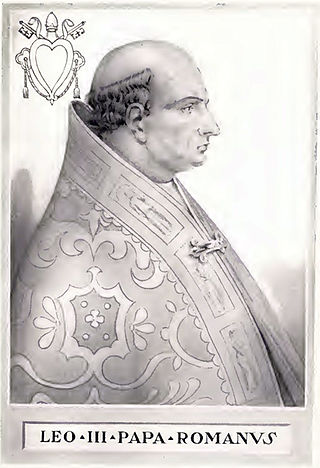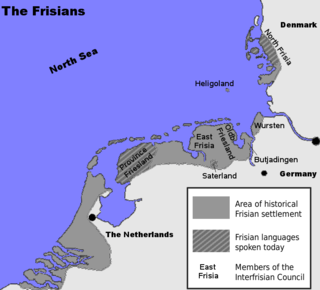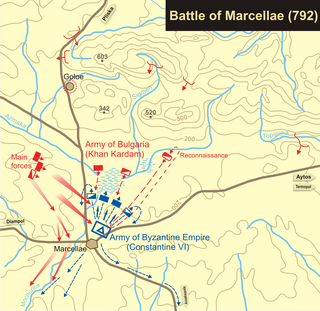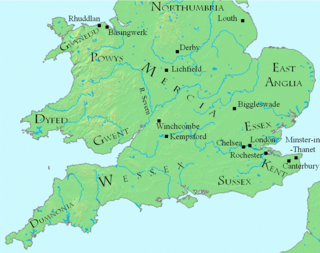The 800s decade ran from January 1, 800, to December 31, 809.
Year 800 (DCCC) was a leap year starting on Wednesday of the Julian calendar, the 800th year of the Common Era (CE) and Anno Domini (AD) designations, the 800th year of the 1st millennium, the 100th and last year of the 8th century, and the 1st year of the 800s decade. It was around this time that the Anno Domini calendar era became the prevalent method in Europe for naming years, so from this time on, the years began to be known as 800 and onwards.
The 810s decade ran from January 1, 810, to December 31, 819.
The 830s decade ran from January 1, 830, to December 31, 839.
The 840s decade ran from January 1, 840, to December 31, 849.
The 790s decade ran from January 1, 790, to December 31, 799.
The 780s decade ran from January 1, 780, to December 31, 789.
The 760s decade ran from January 1, 760, to December 31, 769.

Year 795 (DCCXCV) was a common year starting on Thursday of the Julian calendar. The denomination 795 for this year has been used since the early medieval period, when the Anno Domini calendar era became the prevalent method in Europe for naming years.
The 910s decade ran from January 1, 910, to December 31, 919.

Year 810 (DCCCX) was a common year starting on Tuesday of the Julian calendar.

Year 775 (DCCLXXV) was a common year starting on Sunday of the Julian calendar. The denomination 775 for this year has been used since the early medieval period, when the Anno Domini calendar era became the prevalent method in Europe for naming years.

Year 776 (DCCLXXVI) was a leap year starting on Monday of the Julian calendar. The denomination 776 for this year has been used since the early medieval period, when the Anno Domini calendar era became the prevalent method in Europe for naming years.

Year 780 (DCCLXXX) was a leap year starting on Saturday of the Julian calendar, the 780th year of the Common Era (CE) and Anno Domini (AD) designations, the 780th year of the 1st millennium, the 80th year of the 8th century, and the 1st year of the 780s decade. The denomination 780 for this year has been used since the early medieval period, when the Anno Domini calendar era became the prevalent method in Europe for naming years.

Year 782 (DCCLXXXII) was a common year starting on Tuesday of the Julian calendar, the 782nd year of the Common Era (CE) and Anno Domini (AD) designations, the 782nd year of the 1st millennium, the 82nd year of the 8th century, and the 3rd year of the 780s decade. The denomination 782 for this year has been used since the early medieval period, when the Anno Domini calendar era became the prevalent method in Europe for naming years.

Year 785 (DCCLXXXV) was a common year starting on Saturday of the Julian calendar. The article denomination 785 for this year has been used since the early medieval period, when the Anno Domini calendar era became the prevalent method in Europe for naming years. It is still used today in this manner.

Year 790 (DCCXC) was a common year starting on Friday of the Julian calendar, the 790th year of the Common Era (CE) and Anno Domini (AD) designations, the 790th year of the 1st millennium, the 90th year of the 8th century, and the 1st year of the 790s decade. The denomination 790 for this year has been used since the early medieval period, when the Anno Domini calendar era became the prevalent method in Europe for naming years.

Year 792 (DCCXCII) was a leap year starting on Sunday of the Julian calendar, the 792nd year of the Common Era (CE) and Anno Domini (AD) designations, the 792nd year of the 1st millennium, the 92nd year of the 8th century, and the 3rd year of the 790s decade. The denomination 792 for this year has been used since the early medieval period, when the Anno Domini calendar era became the prevalent method in Europe for naming years.

Year 798 (DCCXCVIII) was a common year starting on Monday of the Julian calendar, the 798th year of the Common Era (CE) and Anno Domini (AD) designations, the 798th year of the 1st millennium, the 98th year of the 8th century, and the 9th year of the 790s decade. The denomination 798 for this year has been used since the early medieval period, when the Anno Domini calendar era became the prevalent method in Europe for naming years.

Year 1081 (MLXXXI) was a common year starting on Friday of the Julian calendar.











